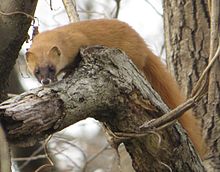Japanese weasel
| Japanese weasel | |
|---|---|

| |
| Scientific classification | |
| Kingdom: | |
| Phylum: | |
| Class: | |
| Order: | |
| Family: | |
| Subfamily: | |
| Genus: | |
| Species: | M. itatsi
|
| Binomial name | |
| Mustela itatsi Temminck, 1844
| |

| |
| Japanese weasel range (blue - native, red - introduced) | |
The Japanese weasel (Mustela itatsi) is a carnivorous mammal belonging to the genus Mustela in the family Mustelidae. It is native to Japan where it occurs on the islands of Honshū, Kyūshū and Shikoku.[2] It has been introduced to Hokkaidō and the Ryukyu Islands to control rodents and has also been introduced to Sakhalin island in Russia.[3][4]
It is often classified as a subspecies of the Siberian weasel (M. sibirica). The two species are very similar in appearance but differ in the ratio of tail length to head and body length.[2] There are also genetic differences which suggest that the two diverged around 1.6-1.7 million years ago.[2] Their ranges now overlap in western Japan where the Siberian weasel has been introduced.[2]
Adult males of the Japanese weasel can reach 35 cm (14 in) in body length with a tail length of up to 17 cm (6.7 in).[3] Females are smaller. The fur is orange-brown with darker markings on the head. The species typically occurs in mountainous or forested areas near water.[3] Its diet includes mice, frogs, reptiles, insects and crayfish.[3][5]
References
- ^ Template:IUCN2008 Database entry includes a brief justification of why this species is of least concern
- ^ a b c d Masuda, Ryuichi & Michihiro C. Yoshida (1994) "Nucleotide sequence variation in Cytochrome b genes in three species of weasels Mustela itatsi, Mustela sibirica and Mustela nivalis, detected by improved PCR product-direct sequencing technique", Journal of the Mammalogical Society of Japan, 19 (1): 33-43.
- ^ a b c d Kodansha (1993) Japan: an illustrated encyclopedia, Kodansha, Tokyo.
- ^ Wilson, Don E. & DeeAnn M. Reeder (eds.) (2005) Mustela itatsi, Mammal Species of the World, 3rd edition, Johns Hopkins University Press.
- ^ Sekiguchi Keishi, Ogura Go, Sasaki Takeshi, Nagayama Yasuhiko, Tsuha Kojun, Kawashima Yoshitsugu (2002) "Food habits of introduced Japanese weasels (Mustela itatsi) and impacts on native species on Zamami Island Archived 2012-02-17 at the Wayback Machine", Mammalian Science, 85:153-160. [Abstract]
External links
 Data related to Mustela itatsi at Wikispecies
Data related to Mustela itatsi at Wikispecies Media related to Mustela itatsi at Wikimedia Commons
Media related to Mustela itatsi at Wikimedia Commons

